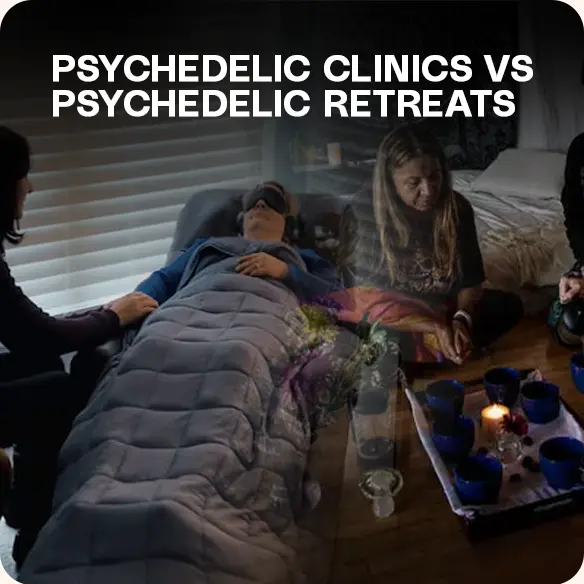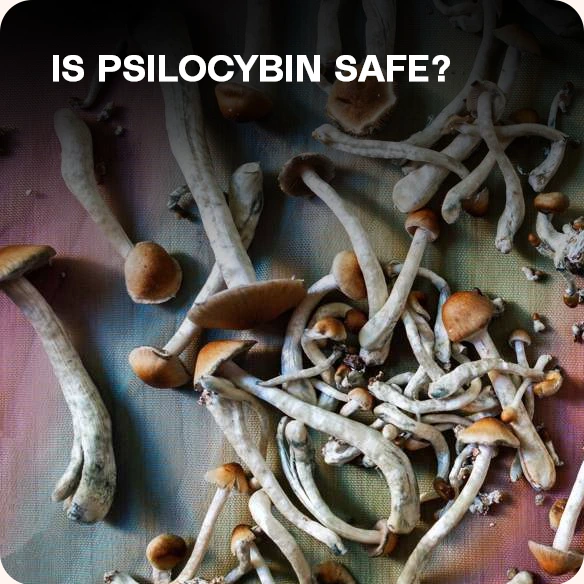What are Psilocybin Mushrooms?

Psilocybin mushrooms, also known as “magic mushrooms,” are a group of fungi that contain a psychoactive chemical compound called psilocybin. Psilocybin is a psychedelic and hallucinogenic drug that causes hallucinations, altered perceptions, and altered emotional states. Some of the fungi groups that contain psilocybin are Psilocybe, Panaeolus, Inocybe, Pluteus, Gymnopilus, and Pholiotina.
Psilocybin converts into psilocin after the consumption of magic mushrooms and activates serotonin receptors present in the prefrontal cortex region of our brain. The activation of serotonin receptors in the prefrontal cortex affects our mood, perceptions and cognition.
History of magic mushroom
The history of magic mushrooms retraces back to 9000-7000 BCE in Tassili, Algeria, where certain rock art is considered a depiction of magic mushrooms, according to Wikipedia. Prehistoric rock art in Villar del Humo, Spain, suggests the usage of Psilocybe Hispanica in religious rituals 6000 years ago. In pre-Columbian times, the Psilocybe genus was consumed by the Mesoamerica natives for religious ceremonies, healing, and divine purposes.
A statue dating back to 200 CE, which shows Psilocybe mexicana, was found in the Mexican state of Colima. In the coronation ceremony of Moctezuma II, the Aztec ruler, in 1502, a Psilocybe species known as teōnanācatl by Aztecs.
Modern History of Magic Mushrooms
According to European medicinal literature, the first known use of magic mushrooms in modern times was when a man offered Psilocybe Semilanceata mushrooms to his family in London. Valentina Pavlovna Wasson and R. Gordon Wasson were the first European Americans to join an indigenous magic mushroom ceremony in 1955.
Albert Hofmann found psilocybin and psilocin in the magic mushrooms in 1958. He considered psilocybin and psilocin as the active chemical compounds in these mushrooms responsible for their psychedelic effects. In 1960, Timothy Leary and Richard Alpert began the Harvard Psilocybin Project to study the effects of psilocybin.
Psilocybin mushrooms’ usage gained popularity by the early 1970s due to the discovery of new mushroom species in North America, Europe, and Asia. The popularity of magic mushrooms further increased due to publications of cultivation methods of magic mushrooms.
Read our detailed guide on Magic Mushroom History in Canada here: History of Magic Mushroom in Canada
Use cases for Psilocybin
There are 4 primary use cases of psilocybin, including medical, therapeutical, recreational, and microdosing. These 4 use cases of psilocybin are described below.
- Microdosing: Psilocybin mushrooms can be used for microdosing, the practice of taking psilocybin in low doses to receive benefits such as improved focus, creativity, increased physical energy, etc. The dosage of microdosing is low enough not to induce psychedelic high and other side effects of psilocybin.
- Medical: Psilocybin mushrooms are effective in treating depression, alcohol addictions, and other substance use disorders, according to researchers at Johns Hopkins University.
- Therapeutical: Psilocybin-assisted psychotherapy is considered an effective treatment for treating addiction and anxiety caused by terminal illness. According to a study done by L. Roseman on patients with treatment-resistant depression, after taking psilocybin therapy, participants’ neuroticism scores decreased and scores for extraversion and openness increased. In 2019, the USFDA gave psilocybin-assisted therapy the status of breakthrough therapy.
- Recreational: Magic mushrooms are used for recreational activities such as parties, cultural ceremonies, religious rituals, etc. The main purpose of recreational use is to induce psychedelic high and experience hallucinations and altered perception.
What are the effects of Shrooms?
Psilocybin mushrooms can have various effects, including both physical and mental effects. The following are the effects of consuming magic mushrooms.
- Altered perceptions: Magic mushrooms can change the way you see, feel, hear, and perceive your surroundings.
- Euphoria: Magic mushrooms can cause the feeling of euphoria and extreme happiness as a result of the activation of serotonin receptors in the prefrontal cortex region of the brain.
- Hallucinations: Magic mushrooms can cause you to hallucinate, i.e. to see and hear things that do not exist.
- Spiritual experiences: Magic mushrooms cause altered perception, and as a result, you might feel like you are having a spiritual or magical experience.
- Physical Sensations: Magic mushrooms can cause dizziness, light-headedness, nausea, temporary headache, increased blood pressure, and vomiting.
Benefits of Psilocybin Mushrooms
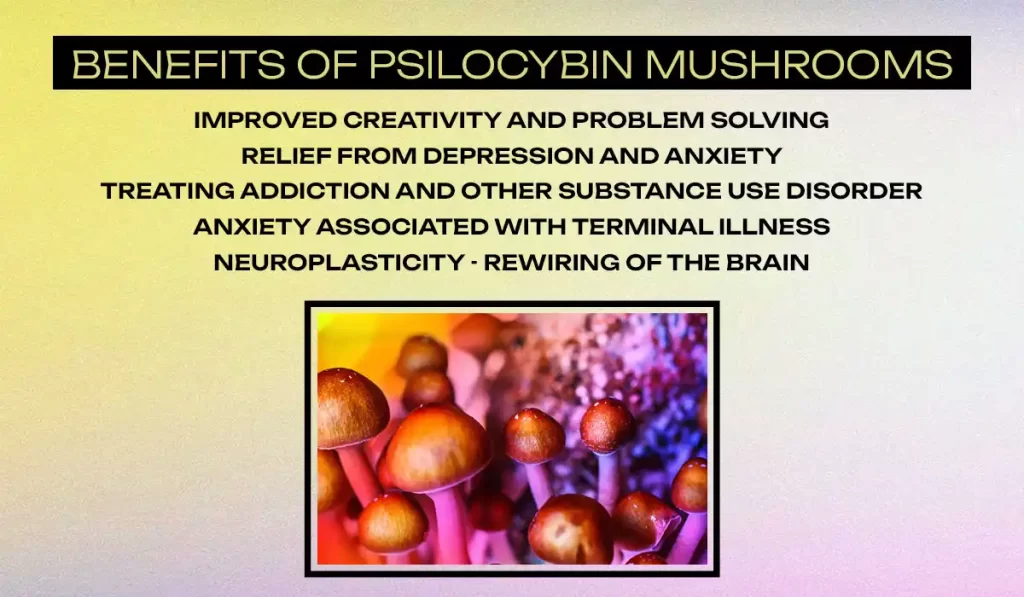
The main benefits of psilocybin include improved creativity and problem-solving, relief from depression and anxiety, treatment of addiction-related disorders, relief from anxiety associated with terminal illness, and neuroplasticity.
Improved Creativity and Problem Solving
Psilocybin mushrooms increase creativity and problem-solving ability by inducing thought states that allow imaginative and creative thinking, according to a study by Luisa Prochazkova and others on springer.com.
In the study by Luisa, 36 people received tasks to find solutions to problems. The tasks included problems with one solution, new problems, and problems with many solutions. After taking 0.37 grams of dried truffles, all participants admitted improvement in creativity, convergent thinking, and divergent thinking.
Research by Natasha L. Mason suggests that psilocybin increases creativity and empathy for a week after consuming psilocybin mushroom tea.
Another research by Natasha L. Mason on Spontaneous and deliberate creative cognition suggests that psilocybin enhances creative thinking and increases the number of spontaneous creative ideas. According to this research, participants, after consuming psilocybin, felt reduced creative thinking temporarily. After 1 week, their creative thinking improved, and they outperformed the placebo group.
According to an article on SagePub by Justin N Bonnieux, when psilocybin is consumed in large amounts, more than a few grams, it reduces creative and imaginative thinking for a short duration, but the negative effect faded, and improvement in creativity and cognitive abilities was observed.
A study done by Sam Gandy suggests that psilocybin induced mental state helps in improving scientific creativity, resulting in key scientific insights and breakthroughs.
Relief From Depression and Anxiety
Microdosing psilocybin mushrooms can improve mental health and give relief from depression and anxiety, according to a large study published by Joseph M. Rootman on Nature.com.
According to an article on MedicalNewsToday, microdosing psilocybin improves mood and mental health and reduces symptoms of depression, anxiety, and stress. All the participants in the research experienced these positive effects.
According to hopkinsmedicine.org, initial doctoral studies on psilocybin showed that it can reduce symptoms of major depressive disorder in adults for around 1 month period. The new studies at Johns Hopkins Medicine suggest psilocybin has significant antidepressant effects, and when consumed with psychotherapy, it can be very effective in treating depression and anxiety.
Treating Addiction and Other Substance Use Disorder
Psilocybin-assisted psychotherapy can reduce repeated patterns of thought and increase neuroplasticity to allow a person who is suffering from addiction a new perspective to look at his addictive and compulsive behaviour, according to HealthLine. This new perspective can allow a person to draw key insights to treat his addiction.
According to a study published in JAMA Psychiatry by M Johnson, psilocybin reduced alcohol addiction in participants, and the rate of heavy drinking days reduced to 9.7%.
Another study by M Johnson reported that 10 participants out of 15 stopped smoking after 1-year follow-up of psilocybin therapy. After a long-term follow-up of 16 months, 9 participants admitted they had given up smoking addiction.
Anxiety Associated with Terminal Illness
A single dose of psilocybin gave relief from depression and anxiety in patients suffering from cancer, according to a study by NYU Grossman School of Medicine in 2016. The study showed that psilocybin created immediate and sustained relief from symptoms of depression and anxiety due to cancer. After a 6.5-month follow-up, the participants showed a sustained reduction in symptoms of depression and anxiety.
According to a study by Chia-Ling Yu and others, psilocybin reduced symptoms of anxiety and fear of death in people with End-of-Life or terminal illness. No severe side effects were experienced by any of the participants.
Psilocybin alters cognition, perception, and mood by creating new neural connections between regions of the brain that usually do not connect. This effect causes flexibility and adaptability, resulting in a decrease in the number of depressing thoughts.
Neuroplasticity – Rewiring Of The Brain
Psychedelics, such as psilocybin, promote neuroplasticity, the brain’s ability to adapt and change in both living organisms (vivo) and lab organisms (vitro), according to an article “Psychedelics and Neuroplasticity” published on Frontiersin.org.
According to a study done at UCSF and Imperial College London, psilocybin can change how our brains function by helping different parts of the brain to connect and communicate, thus stopping people from thinking depressive thoughts. The study showed an increase in the number of new connections between different parts of our brains and reduced old connections. These new connections provide flexibility to the brain to think differently and release old thought patterns.
A study by David J. Nutt and Carhart-Harris suggests that psilocybin activates serotonin 2A receptors and reduces the required energy for the brain to transition from one state to another. This reduced required energy allows the brain to easily transition and become flexible and adaptable to new connections.
A study from Yale University’s Ling-Xiao showed that psilocybin’s single dose increased spine size and density by 10% in frontal cortical pyramidal cells.
Side Effects of Psilocybin Mushrooms

The potential side effects of psilocybin include short-term mental effects such as confusion, distorted thinking, and fear; short-term physical effects such as an increase in blood pressure, headache, and physical sensations; long-term mental effects such as HPPD (Hallucinogen persisting perception disorder), poor sleep, and fear of flashbacks, and long-term physical effects such as heart disease, blood vessel damage, and periodic high blood pressure, according to bocarecoverycenter.com.
Short time side effects
Mental Side Effects
The potential short-term mental side effects of psilocybin include confusion, altered perception, distorted thinking, fear, hallucinations, distorted reality, spiritual experiences, and increased emotional intensity.
Psilocybin impacts the prefrontal cortex region of the brain and activates serotonin 2A receptors, resulting in altered perception and hallucinations.
It also produces elevated mood and euphoria and make you feel extremely happy and joyful. People under the influence of psilocybin can see vibrant color, shapes and distorted patterns.
Under the influence of psilocybin mushrooms, a person can experience visual and auditory hallucinations which can cause them to see or hear things that do not exist in reality.
The sense of time and space fades away for some people after consuming psilocybin. While being on their psilocybin trip, some people can experience intense and heightened emotions and can relive their past trauma.
Physical Side Effects
The potential short-term physical side effects of psilocybin include headache, dilated pupils, increase in blood pressure and heart rate, high temperature, muscle weakness, drowsiness, and nausea.
Psilocybin is known to cause temporary headaches, drowsiness, and dizziness. These effects fade away a few hours after the consumption of psilocybin.
Some people can experience an increase in blood pressure, body temperature and heart rate. Due to intense emotions caused by psilocybin, the heart starts beating a little faster than usual and causes temporary increase in blood pressure.
Long term side effects
Mental Side Effects
The potential long-term mental side effects of psilocybin include HPPD (Hallucinogen Persisting Perception Disorder), fear of flashbacks, negative implications on emotional well-being, change in personality, and addiction.
Psilocybin mushrooms can cause perceptual changes sustained for weeks or months. This condition is called Hallucinogen Persisting Perception Disorder (HPPD). It is very rare, and not every psilocybin user experiences it. This condition is also referred to as “flashbacks”, as past psilocybin experiences can show up in the memory as intense and disruptive visuals.
Psilocybin mushrooms alter our perceptions and can cause long-term personality and behavioural changes. People with mental issues can experience increased anxiety, depression, and other symptoms of psychosis.
Psilocybin is naturally not addictive, but people can develop tolerance and then need to consume a higher amount of psilocybin to have experiences similar to past experiences.
Physical Side Effects
There are no major long-term physical side effects of psilocybin that are proven and identified. However, it is not recommended to over-consume psilocybin mushrooms as psilocybin mushrooms can cause an increase in heart rate every time. You can suffer from heart damage or periodic high blood pressure if psilocybin is over-consumed.
How do you take magic mushroom?
You can take magic mushrooms by eating raw mushrooms, smoking dried mushrooms, drinking mushroom tea, and taking liquid psilocybin.
- Eating: People eat raw magic mushrooms, both dried and fresh.
- Smoking: Dried mushrooms can be used for smoking. Some people try to mix it with cannabis and then smoke.
- Drinking: You can prepare and drink a hot tea from magic mushrooms.
- Liquid psilocybin: Liquid psilocybin is psilocybin extracted from magic mushrooms in liquid form. You can directly ingest it and have the psychedelic experience.
- Psilocybin Capsules: You can consume psilocybin capsules. We, Microdosify, have 3 psilocybin capsule products suitable for microdosing psilocybin, such as FOCUS, CREATE, and CALM.
Safe dosage for magic mushroom
The safe dosage for magic mushrooms ranges from 100 mg to 5 grams of psilocybin. The 100 mg dosage of psilocybin mushrooms is for microdosing, and 5 grams of psilocybin mushrooms is for Terence Mckenna’s heroic dose. Following are the different mushroom dosages that you can follow.
- Microdose: A 100-200 mg of mushroom dose is considered a microdose. It can create positive effects, including improved productivity, creativity, and emotional well-being.
- Low Dose: A 1 gm of mushroom dose is considered a low dose. It can produce euphoria, enhance senses, see vibrant colours, distorted patterns, etc.
- Medium Dose: A 1.75 gm of mushroom dose is considered a medium dose. It can cause visual and auditory hallucinations, distorted shapes, and geometric patterns.
- High Dose: A 3.5-gram mushroom dose is considered a high dose. It can cause psychedelic highs, altered perceptions, and hallucinations.
- Heroic Dose: A 5 gm of mushroom dose is considered a heroic dose or Terence Mckenna’s heroic dose. It can cause intense experiences, including spiritual and mystical experiences, visuals from past trauma, and intense introspective experiences.
Note that you should consult with your family doctor before taking magic mushrooms. Using magic mushrooms requires a lot of experience and safety measures so that you don’t face any frightening experience. Read our detailed guide on magic mushroom microdose scheduling and make informed decision.
How to Get Help for Magic Mushroom Misuse
You can get help for magic mushroom misuse by contacting the Alcohol & Drug Information Referral Service, which can help you with drug and alcohol treatment, detox, self-help and counselling. This service is available for 24 hours and 7 days a week. You can contact the Alcohol & Drug Information Referral Service by dialling 1-800-663-1441 on your phone.
Legality of shrooms in Canada
Shrooms are illegal in Canada in 2024. Magic mushrooms are listed under Schedule III of the Controlled Drugs and Substances Act (CDSA), making it illegal to possess, cultivate, distribute, import, and export across Canada. Some cities, such as Vancouver and Toronto, has decriminalized the possession of magic mushrooms in small quantity, but possessing shrooms in large quantities is still illegal in all provinces of Canada.
Canada Health can grant Section 56 Exemptions for medical research, clinical trials, psilocybin psychotherapy for patients with terminal illness and major depressive disorders, and Special Access Program.
Punishments for possessing magic mushrooms in Canada are the following.
- If it is your first time being convicted, then the punishment could be a fine of 1000 CAD, 6 months in prison, or both for a summary conviction.
- If it is not your first time being convicted, then the punishment could be a fine of 2000 CAD, 12 months in prison, or both.
- The punishment could be 3 years in prison for an indictable offense.
- If the purpose was mushroom trafficking or selling to minors, then the punishment could be 10 years in prison for an indictable offence.
Read more: Are Psilocybin Mushrooms Legal in Canada?
List of popular psilocybin mushroom species
Some of the most popular genera (groups) of magic mushroom species are listed below:
Genus: Psilocybe
- Psilocybe atlantis
- Psilocybe azurescens
- Psilocybe baeocystis
- Psilocybe cubensis
- Psilocybe cyanescens
- Psilocybe mexicana
- Psilocybe semilanceata (also known as Liberty Caps)
- Psilocybe tampanensis
- Psilocybe weilii
- Psilocybe zapotecorum
Genus: Gymnopilus
- Gymnopilus luteofolius
- Gymnopilus aeruginosus
- Gymnopilus luteus
Genus: Inocybe
- Inocybe aeruginascens
- Inocybe corydalina
Genus: Panaeolus
- Panaeolus cinctulus
- Panaeolus cyanescens
- Panaeolus tropicalis
Genus: Pholiotina
- Pholiotina cyanopus
Genus: Pluteus
- Pluteus americanus
- Pluteus cyanopus
- Pluteus salicinus
FAQs
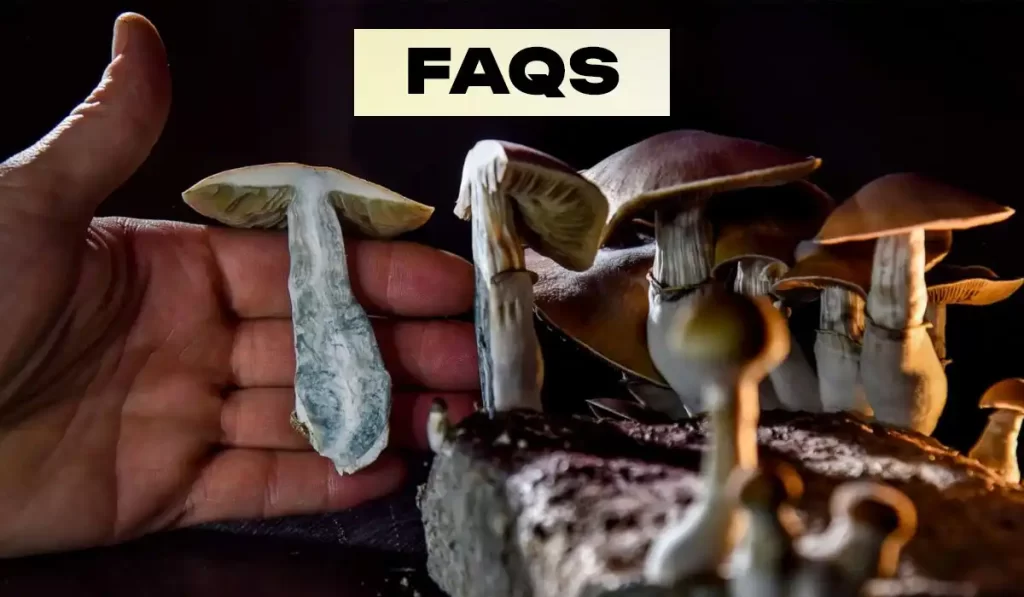
How long do shrooms take to work?
It takes around 30 minutes for shrooms to work and produce its effects.
How long do the effects of Psilocybin last?
The effects of Psilocybin last for around 5-6 hours.
How Long Does Psilocybin Stay in Your System?
Psilocybin stays in your system for 24 hours or longer. The actual duration depends upon the amount of Psilocybin consumed, your body composition, and other factors.
Can you get addicted to shrooms?
Magic mushrooms are not addictive naturally. However, you can develop tolerance to magic mushrooms and crave to consume higher doses of magic mushrooms to produce experiences similar to your past experiences.
Can you mix magic mushrooms with other drugs?
No, you cannot mix magic mushrooms with other drugs as it can cause bad trips and intense hallucinations.
Can you grow your own magic mushrooms in Canada?
No. The cultivation of magic mushrooms in Canada is illegal without a license from Health Canada. As a Schedule III controlled substance under the Controlled Drugs and Substances Act, psilocybin, the psychoactive compound in magic mushrooms, is prohibited without authorization. Exceptions exist for individuals with Health Canada exemptions or companies granted licenses for research purposes. The Canadian government is evaluating the legalization or decriminalization of psilocybin for therapeutic use.
Final Thoughts
Psilocybin mushrooms, or magic mushrooms, are a type of fungi that contain a naturally occurring chemical compound called psilocybin. Psilocybin can produce various physical effects, such as nausea, headaches, muscle weakness, and increased heart rate and blood pressure.
The potential mental effects of consuming magic mushrooms safely include altered perceptions, elevated mood, euphoria, hallucinations, and spiritual and mystical experiences.
Sources
- Erritzoe, D., Roseman, L., Nour, M. M., MacLean, K., Kaelen, M., Nutt, D. J., & Carhart-Harris, R. L. (2018). Effects of psilocybin therapy on personality structure. Acta Psychiatrica Scandinavica, 138(5), 368-378. https://doi.org/10.1111/acps.12904
- Breakthrough Therapy. (2018, January 4). U.S. Food And Drug Administration. https://www.fda.gov/patients/fast-track-breakthrough-therapy-accelerated-approval-priority-review/breakthrough-therapy
- Laura Kurtzman. April 11, 2022. Psilocybin Rewires the Brain for People with Depression. https://www.ucsf.edu/news/2022/04/422606/psilocybin-rewires-brain-people-depression
- Singleton, S. P., Luppi, A. I., L., R., Cruzat, J., Roseman, L., Nutt, D. J., Deco, G., Kringelbach, M. L., Stamatakis, E. A., & Kuceyeski, A. (2022). Receptor-informed network control theory links LSD and psilocybin to a flattening of the brain’s control energy landscape. Nature Communications, 13(1), 1-13. https://doi.org/10.1038/s41467-022-33578-1
- Shao, L. X., Liao, C., Gregg, I., Davoudian, P. A., Savalia, N. K., Delagarza, K., & Kwan, A. C. (2021, August 1). Psilocybin induces rapid and persistent growth of dendritic spines in frontal cortex in vivo. Neuron; Cell Press. https://doi.org/10.1016/j.neuron.2021.06.008
- De Vos, C. M. H., Mason, N. L., & Kuypers, K. P. C. (2021, September 10). Psychedelics and Neuroplasticity: A Systematic Review Unraveling the Biological Underpinnings of Psychedelics. Frontiers in Psychiatry; Frontiers Media. https://doi.org/10.3389/fpsyt.2021.724606
- Prochazkova, L., Lippelt, D.P., Colzato, L.S. et al. Exploring the effect of microdosing psychedelics on creativity in an open-label natural setting. Psychopharmacology 235, 3401–3413 (2018). https://doi.org/10.1007/s00213-018-5049-7
- Bonnieux JN, VanderZwaag B, Premji Z, Garcia-Romeu A, Garcia-Barrera MA. Psilocybin’s effects on cognition and creativity: A scoping review. Journal of Psychopharmacology. 2023;37(7):635-648. doi:10.1177/02698811231179801
- Natasha L. Mason, Elisabeth Mischler, Malin V. Uthaug & Kim P. C. Kuypers (2019) Sub-Acute Effects of Psilocybin on Empathy, Creative Thinking, and Subjective Well-Being, Journal of Psychoactive Drugs, 51:2, 123-134, DOI: 10.1080/02791072.2019.1580804
- Mason, N. L., Kuypers, K. P., Reckweg, J. T., Müller, F., Tse, D. H., Da Rios, B., Toennes, S. W., Stiers, P., Feilding, A., & Ramaekers, J. G. (2021). Spontaneous and deliberate creative cognition during and after psilocybin exposure. Translational Psychiatry, 11(1), 1-13. https://doi.org/10.1038/s41398-021-01335-5
- Gandy, S., Bonnelle, V., Jacobs, E., & Luke, D. (2022). Psychedelics as potential catalysts of scientific creativity and insight. Drug Science, Policy and Law. https://doi.org/10.1177/20503245221097649
- Rootman, J. M., Kiraga, M., Kryskow, P., Harvey, K., Stamets, P., Kuypers, K. P., & Walsh, Z. (2022). Psilocybin microdosers demonstrate greater observed improvements in mood and mental health at one month relative to non-microdosing controls. Scientific Reports, 12(1), 1-10. https://doi.org/10.1038/s41598-022-14512-3
- Psilocybin Treatment for Major Depression Effective for Up to a Year for Most Patients, Study Shows. (2022, February 15). Johns Hopkins Medicine Newsroom. https://www.hopkinsmedicine.org/news/newsroom/news-releases/psilocybin-treatment-for-major-depression-effective-for-up-to-a-year-for-most-patients-study-shows
- Johnson, M. W. (2022, January 1). Classic Psychedelics in Addiction Treatment: The Case for Psilocybin in Tobacco Smoking Cessation. Current Topics in Behavioral Neurosciences. https://doi.org/10.1007/7854_2022_327
- Johnson, M. W., Garcia-Romeu, A., & Griffiths, R. R. (2016). Long-term Follow-up of Psilocybin-facilitated Smoking Cessation. The American Journal of Drug and Alcohol Abuse, 43(1), 55. https://doi.org/10.3109/00952990.2016.1170135
- Ross S, Bossis A, Guss J, Agin-Liebes G, Malone T, Cohen B, Mennenga SE. Rapid and sustained symptom reduction following psilocybin treatment for anxiety and depression in patients with life-threatening cancer: a randomized controlled trial. J Psychopharmacol. 2016 Dec; https://pubmed.ncbi.nlm.nih.gov/27909164/
- Yu, L., Yang, C., Yang, N., Tseng, T., Stubbs, B., Yeh, C., Hsu, W., Li, J., & Liang, S. (2021). Psilocybin for End-of-Life Anxiety Symptoms: A Systematic Review and Meta-Analysis. Psychiatry Investigation, 18(10), 958-967. https://doi.org/10.30773/pi.2021.0209
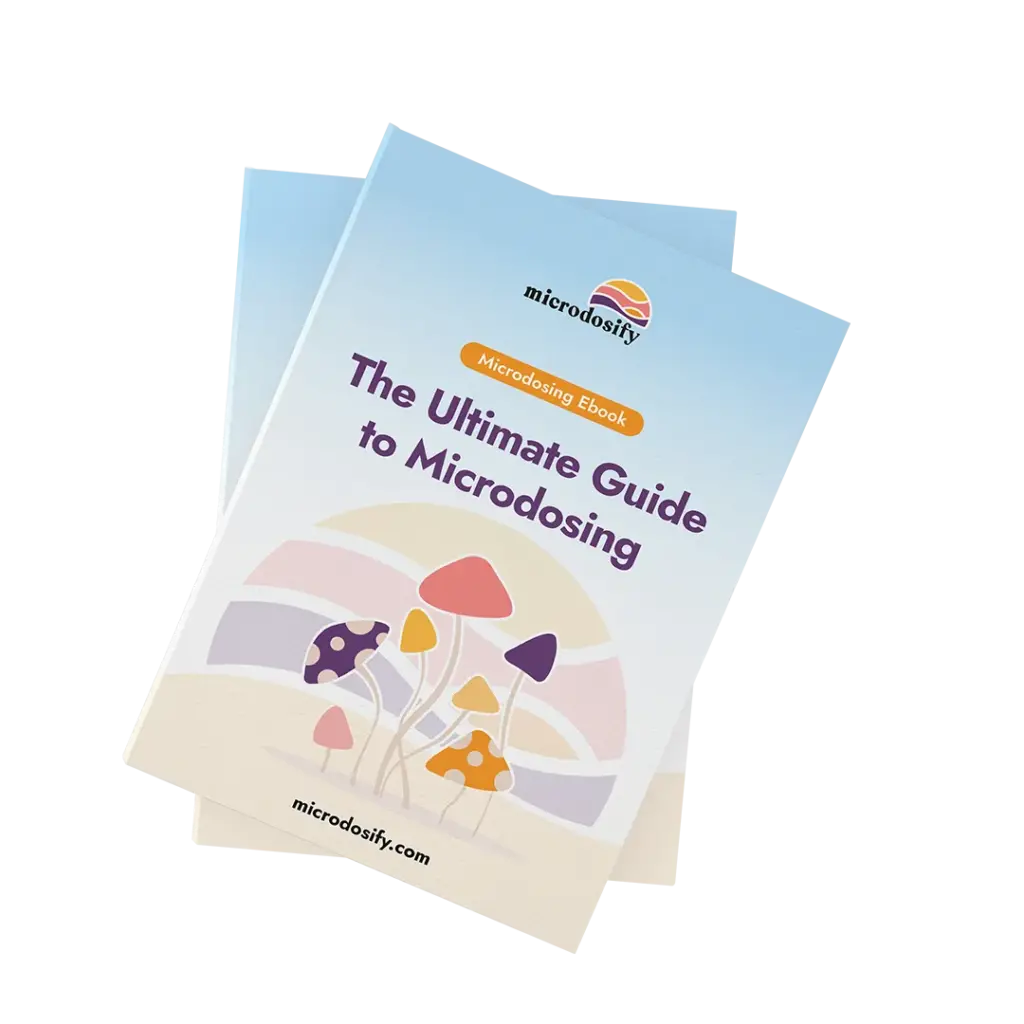


 18 min read
18 min read